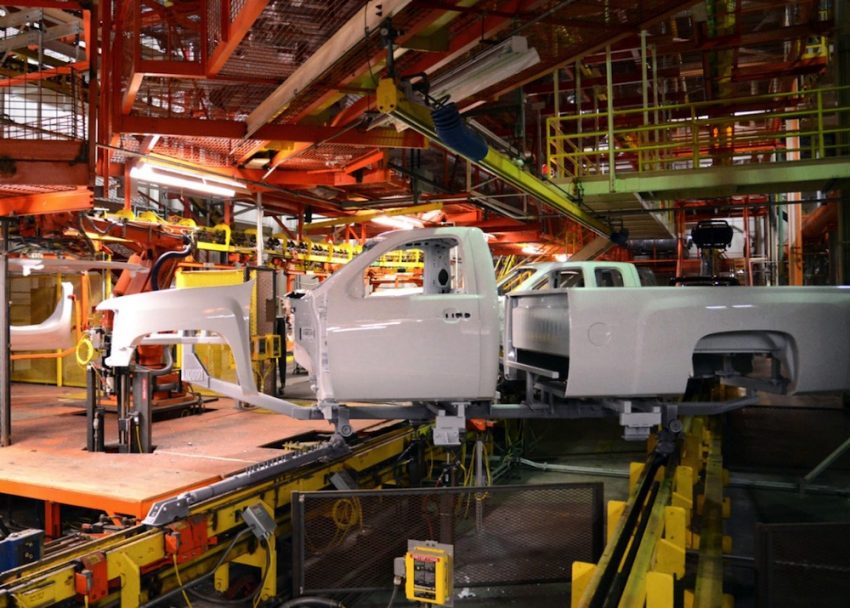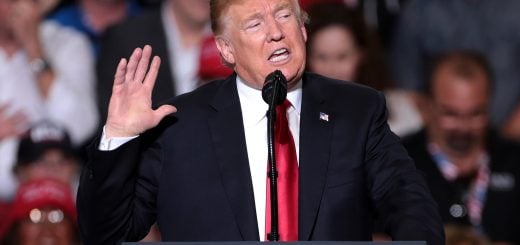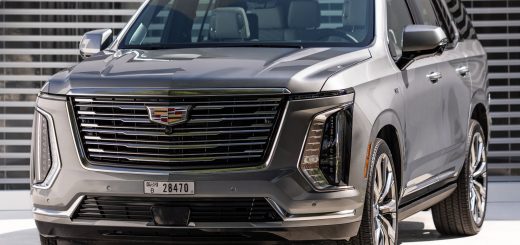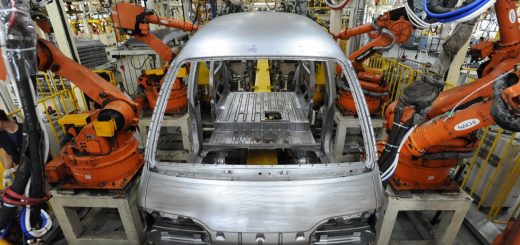On Thursday, President Trump soldiered ahead to protect the United States’ steel and aluminum industries with a new 25 and 10 percent tariff on imported materials. The administration has left Mexico and Canada exempt for now, but automakers have already begun building a case for more tariff exemptions.
The main U.S. trade group that represents General Motors, Ford and Fiat-Chrysler Automobiles will work to place more countries and companies on an exemption list, Automotive News reported Friday.
The new rules allow for an importer to ask the Commerce Department for a waiver if there is a limited supply of the product, or national security is at risk. Although, it seems like a difficult task to invoke the “national security” aspect.
However, President Trump said more countries could be exempt for national security reasons during a 15-day period before the tariffs go into effect.
Matt Blunt, president of the American Automotive Policy Council, said the organization fully supports cracking down on unfair trade policies, but doubled down on calls for a more targeted approach to the tariffs. The new tariffs will hit many U.S. allies around the globe, including Japan, Germany and South Korea.
John Bozzella, president of the Association of Global Automakers, had a less positive take on the tariffs and exemptions.
“A tariff is a tax that will result in higher prices that consumers will ultimately bear. Exemptions will not address the fundamental problems tariffs will create for U.S. car and truck manufacturing. Increased costs will make our industry less competitive and harm American workers, consumers, and our economy,” he said.
GM has previously waved off the new tariffs and said its engineering department will work to minimize material cost increases. The automaker also said it already purchases 90 percent of its steel from U.S. suppliers, but did not mention aluminum.















Comments
This may not be the best solution, but I do believe that the U.S. must negotiate with the foreign nations so they remove their tariffs on U. S. products instead, or else we will have a tariff war.
Trump turns the USA into an island of high price steel and aluminium, increasing the production costs of every item which needs steel and/or aluminium, making them less competitive on the world market. This is an incentive to move such production out of the USA to countries where steel and aluminium prices are not artificially increased.
Besides, the automobile industry needs some special steel variants which the US steel mills can’t produce, so I have read in a trade publication.
While a burgeoning industry can be helped to grow by protecting it from more efficient competitors in other countries, but trying to protect a declining economy by protectionism is bound to fail.
The US Civil War of the 19th century was waged over foreign trade: should the Southern slavocracy impose low import tariffs on industrial products for having cheap machinery and keep the USA as an agricultural, raw material exporting country, or should higher tariffs protect the growth of an US-American industry?
I think that the US steel industry will not made “great again” by protecting it from more efficient steel production in other countries, but on the contrary, it will allow the US steel bosses to keep the low standards of their steel mills and just raise the prices, leading into a further decline.
In all other cases the capitalist credo is that by exposing an industry to a sharp competion makes it stronger — so the US-dominated international financial institutions World Band and IMF (International Monetary Fund) imposed e.g. on Argentina to do away with protective tariffs for its industry, which then led to the destruction of the industry instead of its growth, which needed an initial protection just as the US industry needed in the 19th century.
you did not mention that some foreign government owned steel mills are selling steel below their costs just to keep their steel mills up and running. steel mills in the US now produce as many tons of steel with 70 workers as they used to produce with 700. the stockholders will not stand for selling the steel below cost and loosing money
Could you please provide concrete examples, and verifyable facts?
my friend was a engineer for a steel mill rolling mills and other steel mill equipment company. he spent year in the steel making business so he saw the reduction in workers. about the steel being sold below cost from outsiders just google this and you will see lots of info. hopes this helps
Steel mills have suffered the same fate in all imperialist countries; in Germany and France, one steel mill after the other had been closed; now Indian owned Tata Steel Europe and German ThyssenKrupp merge their steel mills (only the European ones in Tata’s case) in one company to cut costs. Other people have also learned to produce steel, and at lesser cost. That is life: an endless process of becoming and fading away. One can’t stop history.
But actually that was not my question, unfortunately I have not been specific in my question. This was about subsidizing “government owned steel mills”. I don’t know of these. Now POTUS Trump is trying to subsidized the US steel industry by imposing higher prices for steel and aluminium on the US automobile and other industries using those metals.
in 2016 the Chinese state announced large scale closures and redundancies in heavy and primary industries. the Chinese govt controls the steel and other industries because it is a communist country
Motorman describes the opposite of he claimed above. He tells us that the Chinese government, the tool of the sacred order which misnames itself the “Communist Party”, has forcibly reduced the production capacity of the steel mills in China, so that no manager of such steel mill would have to sell their product below cost in order to outsell their competitors, as is the way of the capitalist “free” market.
And I believe that they closed not only state owned steel mills, but also private owned ones. This ruling order is quite ruthless in its actions. Or maybe the other way: they shut down state owned factories so that the private ones would florish.
Whatever, the Chinese government did a rational thing to save the world capitalist steel market by reducing the pressure of the world wide capacity surpassing actual world wide demand.
The ruling order of China could have let play the laws of the capitalist economy and flood the world with super-cheap steel, thus driving all steel mills in other countries into bankruptcy. But they didn’t.
On the other hand it is natural that this country which encompasses a quarter or so of all humankind should also be the place where a quarter or so of world wide production not only of steel but of many other goods is located.
For some decades the US could flood the world markets with the products of their superior industry and especially agriculture, but the times they are a-changing, and humanity rises up.
And another word of caution: it was the explosive development of industry in China with its accompanied demand which saved capitalism from another great depression as the one which led to the 2nd World War. And note that this economic development of China was only possible because China managed to fend off all attempts of the USA to conquer China as the ultimate prize of the War in the Pacific from 1940 to 1953.
You see, the world is full of contraditions and contradictory developments. Deal with it.
By 2016 following economic downturn in China (see also 2015–16 Chinese stock market crash) Chinese industrial companies (steel, aluminium, paper etc) had developed gross overproduction capacity problems, with overcapacity rising from 0% in 2007 to an average of 13% by 2015, with figures higher than 30% in some industries (cement, steel in 2014).[4] At the 2016 National People’s Congress the country’s government recognised the issue of the ‘Zombie Enterprises’ and announced that it was to close or reorganise many state owned (public) industrial companies by 2020.[5][6] In coal and steel industries resultant loss of work was expected to result in 1.8 million redundancies (15% of workforce), with total redundancies estimated to be up to 6 million workers.[7]
Thanks to Motorman for the additional and more concrete facts. Is that taken from a Wikipedia article? Which one? The bracketed references to footnotes make me think that.
Motorman again presents facts which prove the opposite of what he had claimed in his first contribution.
The big question is: how much of the steel used in the USA is imported and how much produced in the country. I see mostly just figures for the relative share of various sources of imports, but not the whole balance sheet of local production, exports and imports.
In my view POTUS Trump is again engaged in symbolism. I am quite sure not hardly any worker will be hired because of making steel and aluminium more expensive in the USA
wrong again. http://nbc4i.com/2018/03/08/republic-steel-planning-to-reopen-ohio-plant-after-pres-trump-announced-tariffs/
@motorman of March 11 12:52 PM:
This article contains what they call in financial informations a “forward looking statement”, with actually speculations about what might happen in the future: “Republic is prepared to respond quickly to an anticipated uptick in demand” — but if this anticipation does not materialize?
Anyway, there the world wide capacity to produce steel(s) is higher than the real demand (demand ready to pay for the deliveries). This can and should be managed in an international concert of producers and consumers.
Unilateral actions of one party can only lead to a deterioration of the situation.
And consider the old reality: if there is an industry in decline, there is no way to reverse the decline by protecting inefficiency.
For workers on the other hand, there is only one sensible way of action: to act in international solidarity of all by the catchword “an injury to one is an injury to all”. To subordinate worker’s interests to those of an employer is the way to disaster.
the question is do the American taxpayers want to pay a little more for a product made with American steel and aluminum or pay more taxes to keep the American workers on unemployment, welfare and food stamps because they can not find a job.
Hes already lowered corporate taxes significantly, these tariffs will push automakers to work with american companies wich will push these american facilities to increase/expedite production.
Tariffs save lifes. Our steel industry needs to be supported. We need to stop importing Steel from the third World. What if they decide they don’t want to sell to America. This probably means they have weapons of mass destruction. President will send in the military And kill them all. And Install a new government that is more friendly to the USA. If you are against Tarrifs you may be a warmonger.
Yeah, “kill them all” — that is the ultimate result of POTUS Trump’s policies. Destroying all human life on earth by drawing all of humanity into the inevitable decline of the US empire.
The gargled syntax, misshapen form, and incendiary taunts?
We got a bot!
What, this is the best bot that Russia got? Even Bob’s bottom cushion leather complaint had more gumption than this roosky.
driver through Pittsburg and see all the empty and decayed steel plants and all the lost jobs that went to other countries . SAD
the unions had a lot to do with this also with their work rules. that is why the steel companies that are still here in the USA have one tenth of the employees they used to have to produce the same amount of steel
Without us organizing our solidarity thru trade unions, we would be completely lost, and reduced to a state like the slave toiling on the cotton fields of the slavocracy, at the mercy of the whip without means to defend ourselves.
Sure, the steel bosses might be able to produce cheaper, but our life would be miserable.
Norplant sure how many jobs yet but Lorain Ohio will be happy to get any jobs.
They are restarting a plant due to the tariffs
My concern is if we ever got into a new global conflict we could not make the steel needed as we did in WW2.
They want to claim immigration and global warming as national security issues. But they fail to reference the lack or the inability to produce materials that would be needed to defend our country.
Trump said the tariffs is a tool to force countries that apply tariffs on US goods to the bargaining table and will help rework treaties; this makes sense as why should US companies be penalized by foreign governments especially Europe exists because of US military presence to keep Russia from conquering them in a heartbeat.